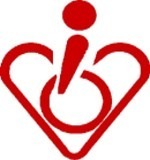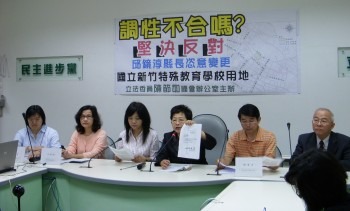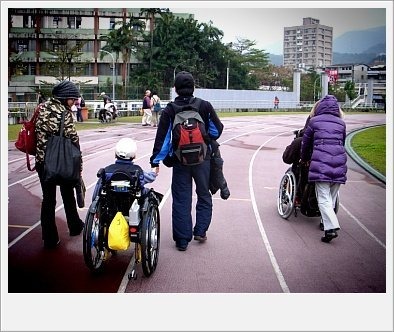The year of 2007 is an important year to persons with disabilities in Taiwan. “People with Disabilities Rights Protection Act” is passed in July of 2007. The law adopted World Health Organizations ICF (International Classification of Functioning, Disability and Health) to examine and classify disabilities. In the same year, United Nations announced CRPD (Convention on the Rights of People with Disabilities) in December. These two events are heavily concerned human rights of persons with disabilities.
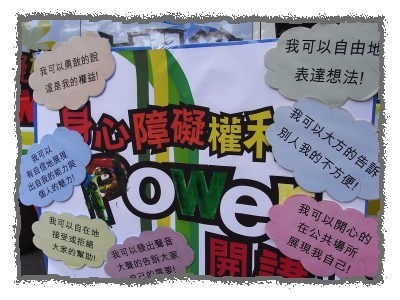
United Nations CRPD is covered the following field of rights such as civil right, political participant, education, health and medical rights, work and employment and protection of social participants. The convention is emphasized that persons with disabilities own rights of equal opportunities as general persons. It focuses on development of individuals, social participant and equal opportunities. If we take this point as a guiding principle of examining human rights of persons with disabilities, we can divide the rights as internal form and external form. The internal forms of rights include individual existence and protection of rights of acting on one’s own. The external forms of protections include eliminating barriers which were set by social environmental factors. The protections are set to insure persons with disabilities owning capability of living independent, fully participating social lives, being on the same basement as equal to others and owing rights of living in a barrier-free environment.
This article will discuss three parts of rights of persons with disabilities by examining internal form of human safety, economic safety and external form of social participants. I will especially examine current human rights of persons with psychologic disability. The population of person with psychologic disability is increased to a double number in the past decade. This group of people is suffering social discrimination as a burn mark in mind which can be a reflective shadow as all persons with disabilities.
The population of persons with disabilities reached to the amount of 1.07 million, the population of person with psychologic disability is increased to a double number than ten years ago.
The amount of receiving disabilities identification brochures has reached to 1,071,073 persons in the end of 2009. It is increased 2.9% to compare with the same period of time of 2008. If we compare the number with ten years ago, 1999, the amount of persons with disabilities is increased 65.07%. It is especially notable that persons with psychologic disability are increased 112.15% and persons with major organs disabilities increased 116.96%.
The amount of persons with psychologic disability is increased from 48,464 persons of 1999 to be 107,663 persons. It is consistently increased by the rate of 6000 persons per year. In comparing percentages of gender, male persons with psychologic disability are 27,178 persons and the female persons are 21,286 persons in 1999. The difference is about 5,892 persons. In the year of 2009, the numbers of male persons become 54,682 persons and the female ones are 52,981 persons. The difference becomes 1,701 persons.
We take the increasing numbers and gender percentages of persons with psychiatric disabilities to examine 2009 Taiwan human rights’ current situations of persons with disabilities as a beginning. The late ten years increasing number of psychiatric patients is certainly not the only reason of making statistically increase of persons with psychologic disability. We may say that, receiving disabilities brochures may gain support of social welfare resource and letting those resenting marked persons with psychiatric disabilities go for application. The other observation is that discrimination to persons with psychologic disability remain exist in the society; they could not get social resource or any support. Persons with psychologic disability or their families can only search for resource of social welfare.
There are 1,937 beds of institutes which are offered to persons with psychologic disability care services. According to estimation of Ministry of the Interior, the care needs of chronic psychiatric patients are 6,772 beds of institute service. There is about 5,000 beds difference. If we count official statistics, there are 31,000 persons who receive live subsidies and 1,328 persons who receive baby sitting subsidies. The government resource only care about 3/10 persons with psychologic disability. The caring resource of community show larger inadequacy. 2009 community living and life serving plan serve only 24 persons with psychologic disability.
Persons with psychologic disability are discriminated to the followings: cannot be government employees and cannot be covered by life insurance.
Persons with psychologic disability live in a situation of surrounding all kinds of thorns in Taiwan’s society. There are plenty of prejudice and stereotypes of people who thought persons with psychologic disability are emotional unstable. There are not many job opportunities for them. We can even find the regulation of Governmental Employment Law article 28 section 1 item 9 states that a medical doctor’s diagnosis of a person who has psychiatric illness cannot be hired as a government officer. Obviously the law is against to the regulation of Constitution, Employment Service Law and Persons with Disabilities Rights Protection Act.
The statement is employment discrimination. It deprives their rights of being governmental officer. The attitude of Ministry of Personnel insists that based on interest of the State to insure public welfare and to promote public goods is a necessary and reasonable limitation to their rights of being governmental officers. The State neglects rights of persons with psychiatric illness to as extreme range.
In addition to government employment, psychiatric patients are excluded to life insurance. It is due to Insurance Law article 107 regulated that the death payment of insurance of persons with mentally impaired or diminished mental capacity are invalid. The reason of making this article is to avoid moral risk. It is the same vague inclusive concept to be used as protection causes of moral risks but discriminate against persons with mental and psychologic disability in real life. The Article 25 of the UN Convention on the Rights of Persons with Disabilities states that “Prohibit discrimination against persons with disabilities in the provision of health insurance, and life insurance where such insurance is permitted by national law, which shall be provided in a fair and reasonable manner.” It is set to protect basic human rights of persons with disabilities and let them gained social resource fairly. The 107 article of Insurance Law is violated regulation of international human rights for persons with disabilities.
When Mental Health Act and Persons with Disabilities Rights Protection Act passed in 2007, two laws regulated that media cannot use discriminated terms on psychologic disability patient, or describe patients by using misguided reports which are led to discrimination. Though media do not obviously describe criminal behavior of persons with psychologic disability, we still can easily find news report using ‘psychiatric male’ or ‘suspected’ terms to imply the events. We also find news talking programs attendant made fun of late president A Ben by calling him “non psychologic disability”. Protest of disabilities groups rose immediately.
Shortages of caring resource of persons with disability make heavy caring loadings of their families.
Persons with Disabilities Protection Act was amended in 2007, it regulated a protection service chapter set to secure person liberty and safety on persons with disabilities. The chapter regulated not only protect persons with disabilities from desertion, abuse, restriction on personal freedom or exposing to dangerous or harmful environment, but also request immediate report and protection placement. However, a Taichung male with disabilities was locked in his home platform due to being unable to manage his own excretory issues. Neighbors reported six times to local police and paid visits to the place. Policeman was refused and made no further report to the social Bureau. A social worker took the male for a hospital exam and found no obvious wounds. The case cannot be judged as being abused and replace the man. It showed issues of reporting system and social worker judgments. There is a gap between regulation and implementation.
This case showed inadequate care resources for persons with disabilities in Taiwan. There are 267 welfare institutes for persons with disabilities. The total caring service can offer 15,244 persons of needs. However, due to inequality resource distribution of areas, the supply of some areas is down below the needs. Some areas cannot even offer the type of residents’ service. Persons with disability cannot get care services at the neighborhood that they are familiar. Besides these conditions, the statistics of 2006 Tai-Min Area Living Needs Survey of Persons With Disabilities showed that the rate of persons with disabilities who have difficulties to self-care is nearly to 50%. There are about 240,000 persons who need community type welfare services. Now the services supply only the amount of 4,000 persons. Therefore, care loading for persons with disabilities swift to their families. The caring services become heavy mind and body loads of carers of their families. In the mean time, many families and their disability children become aging. Those persons with disabilities grew turn to be carers for their parents. We found many cases run into death roads for lacking supports of social resources. Cases are reported by medias such as “ psychiatric brother killed his psychiatric youngster and burned charcoal to die”, “a woman with no money took her disabled child burned charcoal to die”, “an old father strangulated his mental disability child and suicide”, “a physical disability dutiful child used a pillow to muffle his father”, “a seventy old woman exploded gas with her psychiatric daughter”. These cases are more than ten of this kind of cases.
Unemployment rate high, income stay low to make persons with disabilities cannot live with an economic independent and dignity life.
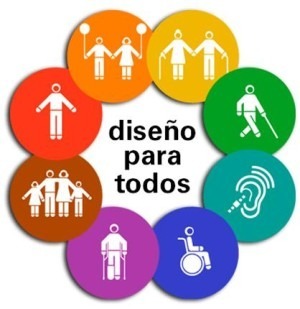
Under the impact of global financial storm impact, unemployment rate raised to 5.75% and above. Then the employments of vulnerable persons with disabilities were strike harder than ever. The mid-March survey of the League of Welfare Organizations for the Disabled found that 46% of persons with disabilities stay unemployment. There were 40% of them asked help for public employment service and got no actual help. For those who have jobs, there were 54.17% persons could earn no more that basic employment salary 17,280 NT. There were 33% persons got even lower than 10,000NT salary. There were 27% persons whose jobs were none typical job and only less that 10% of them can get reimbursement from the government work income maintenance program. In the 2007 statistics of labor of persons with disabilities of Council of Labor Affairs showed that 22.8% of 588,641 labor persons with disabilities are employed. 72.6% of them are none labor population. 66% and about 284,707 persons of this population were seriously disabled and could not work. 4.6% and 26,957 persons of this population were ended jobs due to company closed or section closed. 38.3% were laid off. 22.2% were loosing jobs due to physical over loaded or job overloaded.
We can find those data showed inadequate economic safety for persons with disabilities. Those persons with disabilities who got jobs and being hired earned as low paid and none typical jobs. Most of the jobs are hired by fundamental construction or by service business. These jobs are easily impact by weak economic and loose their jobs. Due to the linking amendment policy between jobs and welfare policy in Taiwan, low paid workers as persons with disabilities cannot get reimbursement from government. Even the policy of social insurance system makes difference in giving resource. Though Pension Act is regulated to offer no working capability persons with disabilities disabled pension and basic insured pension (financial status screening article), the system paid to 22,482 persons which is only 10% of 2007 statistics, 284,707 persons with serious disabilities and cannot work. For those who left employment market because of their physical ability could not bear to work, Persons with Disabilities Right Protection Act article 47 had set a regulation that the government have to establish an early retirement system for persons with disabilities but it has not been set yet.
A new regulation about quota employment system for persons with disabilities was adapted from July, 2009. The public sectors whose employees’ amount is beyond 34 persons need to employ 3% staff with disabilities. The private sector whose employees’ amount is beyond 67 persons need to employ 1% persons with disabilities. At the time of amending the Act, some job criteria of certain special departments are considered. The Act requested to set other regulation for counting the quota amount of these departments. These seven departments include Police Administration and Fire department of Ministry of Interior, Ministry of National Defense, Coast Guard, Directorate General of Customs, Ministry Of Finance, Airports of Ministry of Transportation and Communications and Ministry of Justice. However, these departments did not earn a professional career evaluation and determined that persons with disabilities are not qualified to those jobs just based on their shallow (or even prejudice) stereotypes understanding about persons with disabilities. Some departments even stated that their concern were safety and health of persons with disabilities. Especially Police Administration and Ministry of Justice excluded more that 80% of staff. They hold reasons such as their jobs are heavy duties and responsible to go mountain and remote areas, days and nights, high mobility requested, professional knowledge requested, body power and time loading are heavy. They thought that persons with disabilities cannot handle with the working loads. Then, many jobs of police departments are backup investigation and administration support. The Ministry of Justice also excluded jobs such as booking and administrative officers which are low mobile work. Examining reasons of these departments, it reflected real wills of current government applying protection of employment rights of persons with disabilities.
On the list of unfulfilled employment quota of persons with disabilities announced in Nov., 2009, the first ten private sectors are all science high tech industries such as TSMC, AUO, Chimei….etc. The total amount of unfulfilled employment is 580 persons. There were about 3100 persons’ job opportunities of the private sector were not released. These companies would rather pay the quota payment than hire persons with disabilities. The unfulfilled employment amount of public sector was relatively smaller. Ironically eight of the highest ten units are social justice maintenance and public power enforcing departments such as many local courts, Examination Yuan and Judicial Yuan. Having fair job opportunities for persons with disabilities are one of their basic human rights.
On the road of being disabled is hard to walk on, many persons of the society are lack of civil rights concept.
For the part of social activities participation, many persons with disabilities cannot walk through barriers to join activities. Due to barriers exist in soft wares and hard wares of environment, they are hard to walk. Though Disabilities Welfare Law regulated on making environment barrier free in 1990. The policy has been made about 20 years and many roads are still uneven to walk. The guidance bricks that designed for the blind and ramp designed for wheel users hidden lethal errors. Some bricks were set to guide to wall or ramp were to design to steep to let wheel users turn over. For the public buildings, regulations have been set to rule those collective living buildings. Yet, there are about 1,116,000 old departments are five levels and under. These buildings are full with barriers and let persons with disabilities and unmovable aging persons who live there are just like living in “home prisons”. If a person loose freedom of moving, he has problems of getting medical care or taking education.
On the traffic equipment issue of moving between two places, besides the person drives himself/herself or served by their families left only service of using barrier-free buses. Because besides Taipei offers service of low chassis buses to serve wheel-chair users, few public traffic routes and buses are offered in other areas, neither to offer services of low chassis buses. For the long distance traffic equipment, high speed railway and mass rapid transit(MRT) are designed barrier-free. However, especially bridges between platforms and stairs in railway stations are still under construction. Due to limited resource of barrier-free buses, many areas limit services prior to medical purpose. The service of barrier-free buses are frequently limited service areas. Without barrier free roads and transportation equipment make persons with disabilities cannot live independently and deprive their freedom of moving. This is a problem of human rights.
Besides these issues, it is a pity that the society is fundamentally neglect human rights of persons with disabilities. Many people treat persons with disabilities with a sympathy and mercy attitude. Therefore, it is easily to find many offensive behaviors of human rights of persons with disabilities. These behaviors are not only lacking awareness but also no reflection. An international sightseeing level hotel rejected entrance of a training guide dog. A public Sizhi multiple used sport field refused wheel chair uses to enter and answered correcting letters of disabled groups by saying “Field is not fit for persons with disabilities and pats to keep safety for exercising people and persons with disabilities”. A field show of a foundation named to fulfill creative dream of children is held in National Theater ground and showed rejection of selling tickets to persons with wheel chair users.
In addition to these cases, Li-ron airplane company and China airplane company all once rejected persons with disabilities to take airplane alone or restrict numbers of wheel chairs. Reason they raised is concern of flight safety such as emergency event on the air and airplane attendants cannot rescue in time. These airplane companies mentioned that a protection position is made especially for safety of psychologic disability persons and wheel chair users to fly with a companion. One other reason of Li-ron airplane company is that local airports are short of boarding equipment for wheel chairs. Due to airplane types, they need this companion person to bear disabled person from cabin door to the seat.
The attendants offer no help is due to avoid accidents and cannot take the responsibility. To transfer responsibility of lacking barrier-free environment to persons with disability is damaging their consuming rights. It is a different treatment of discriminating persons with disabilities.
Persons with Disabilities Protection Law has been amended to Persons with Disabilities Rights Protection Act in 2007. The legislative purpose made it clearly that “aims to protect the legal rights and interests of people with disabilities, secure their equal opportunity to participate in social, political, economical and cultural activities fairly, while contributing to their independence and development.” It has been two years implementation, discrimination is still taken under the reason of protection in the society and some government departments. The rights just build on a foundation of sand castle. People see a wonderful outlook and cannot bear any flush of waves.
The concepts of civil rights of persons with disabilities need to be fully applied. Education to the whole society is needed. It is the responsibility of the government. Because human rights of persons with disabilities are political issue, not welfare issue.
Secretary General of the League of Welfare Organizations for the Disabled, Yu-Ling Wang.
